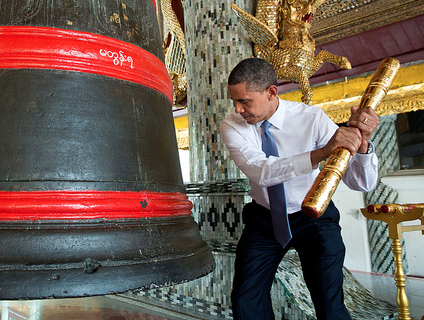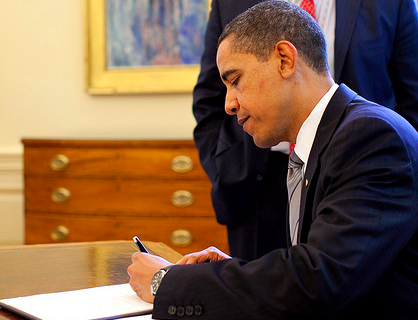Americans love the idea of the whistleblower: one brave person willing to stick their neck out for the greater good, even in the face of severe blowback. Many American high school students read On Civil Disobedience, Henry David Thoreau’s classic treatise that urges Americans to take a stand against government’s ills. But more than 160 years later, legal protections for whistleblowers haven’t caught up with Thoreau’s ideals. Americans who disclose government misconduct risk losing their jobs and their homes—and some are prosecuted under the Espionage Act, a 1917 law originally intended for dealing with foreign spies. That’s life for national-security whistleblowers under the Obama Administration, according to a new documentary premiering next week titled War on Whistleblowers: Free Press and the National Security State.
The film, a project of the Brave New Foundation, focuses on four whistleblowers: Michael DeKort, a former project manager for Lockheed Martin; Thomas Drake, a former senior executive at the National Security Agency; Franz Gayl, an adviser for the Marine Corps; and Thomas Tamm, a former attorney to the Department of Justice. Each exposed grave misconduct, and each faced severe reprisals from their employers and the government. The film also includes commentary from one of the most famous whistleblowers of all time: Daniel Ellsberg, a Vietnam War analyist for the military who released the “Pentagon Papers,” which detailed US mistakes in Vietnam.
“It’s extremely dangerous in America right now to be right as a whistleblower when the government is so wrong,” says Drake, who was charged under the Espionage Act for disclosing secret warrantless surveillance of Americans by the National Security Agency (the major felony charges were eventually dropped after an outpouring of public support for Drake.) “Speaking truth to power is now a criminal act.” Jane Mayer, a staff writer for The New Yorker who won the George Polk Award for her coverage of the Drake case, explains the unusual measures she had to take during the course of reporting the story. She and Drake couldn’t talk on the phone because he was being charged with leaking and there was concern of eavesdropping, so she had to meet sources in unmarked hotel rooms. “It does not feel like America, land of the free press,” she says in the film.
Michael DeKort was a lead systems engineer at Lockheed Martin, in charge of the Deepwater program for the Coast Guard. He became aware of serious problems with Lockheed’s execution of the contract. “The waterproof radios weren’t waterproof, the communications equipment could compromise national security, the electronics equipment installed outside of the boats wouldn’t survive harsh weather, and the camera surveillance system had major blind spots,” he tells Mother Jones. After his supervisors refused to listen to his complaints, he made a YouTube video exposing the problems and was dismissed by Lockheed, a move that led to a congressional hearing, the boats being taken out of service, and quite possibly, a life-saving deterrent against disaster. DeKort says he is still assisting the Department of Justice with its case against the subcontractor that performed the hull design services, but the US government “has no apparent intention to compensate me for bringing the problem to attention.”
The filmmakers take great care to emphasize the difference between leakers and whistleblowers, framing their subjects as the latter. As Jesselyn Radack, national security and human rights director at the Government Accountability Project, explains, whistleblowers are employees that disclose information they “reasonably believe evidences fraud, waste, abuse or a danger to public health or safety” while leakers simply make secret information public (in many cases, whistleblowers take extreme care not to divulge classified information).
It’s a distinction the Obama Administration hasn’t always made, mounting an aggressive campaign against Drake and spearheading a multiyear investigation against Thomas Tamm, who went to the New York Times with information about George W. Bush’s warrantless wiretapping program.
In November 2012, Obama signed the Whistleblower Protection Enhancement Act (WPEA), a law that improves protections for federal employees and makes it easier for the government to discipline employees who retaliate against whistleblowers—a crucial provision, given that many whistleblowers lose their jobs. The National Defense Authorization Act of 2013 also includes a section that strengthens protections for government contractors—a law that would have greatly helped DeKort’s case.
“We’ve never had a president more supportive of federal workers who blow the whistle—except when it comes to national security,” Angela Canterbury, director of public policy at the Project On Government Oversight, where I used to work, tells Mother Jones. National security and intelligence employees were left out of the WPEA, and even though the president issued a policy directive extending protections to these employees, Canterbury says that the directive has inherent problems. For one thing, it protects only whistleblowers who report wrongdoing internally—which can be self-defeating when your employer is behind the wrongdoing. Tom Devine, legal director at the Government Accountability Project, also notes that Obama is seeking new rules that would allow the government to fire thousands of employees without appeal if they work in the national-security arena. “We’ve warned the White House many times, if you put whistleblowers in jail your legacy will be defined for prosecuting them for exercising free speech rights,” says Devine.
DeKort, who blew the whistle on Lockheed, adds that the government needs to understand that “if people did the right thing, whistleblowers wouldn’t exist. When was the last time a whistleblower raised an issue that wasn’t correct? Do you know how insane you’d have to be to go through all this crap if you were wrong?”
















